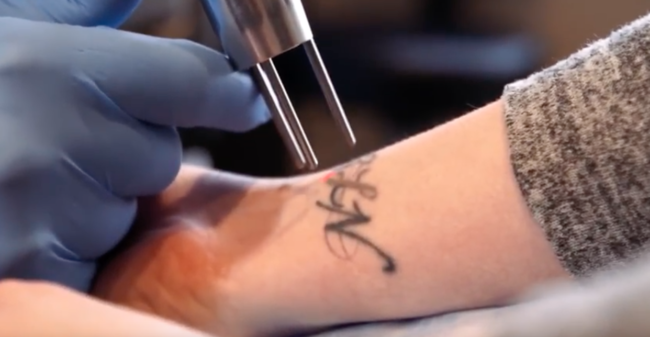
Interested in starting a free or low-cost tattoo removal program but not sure what type of person to recruit to take off the tattoos?
Determining who is legally able to operate a tattoo removal laser device depends on the state in which you are located. And it’s not always easy to find the information.
Fortunately, laser producer Astanza Laser is an expert on the subject and has created a webinar to educate others on how to research the regulations that govern the use of laser devices.
The webinar, Tips for Researching Laser Regulations in Your State, covers the medical use of lasers for everything from skin resurfacing and tattoo removal to hair removal.
Presented by Justin Arnosky, Astanza’s vice president of clinical education (who also serves as director of New Look Laser College operated by Astanza), and Jessie Brandt, the company’s brand marketing manager, the webinar gives information on one of the initial steps you should take when planning to start a tattoo removal program. And that’s doing careful research. Because of government bureaucracy and sometimes difficult-to-navigate government websites, having these research tips can be very helpful.
The webinar focuses on several topics applicable to laser tattoo removal:
What sources can be trusted
The first place to begin is to search the Internet for your state’s board of medicine website. These have different names in different states. In addition to (name of state) “board of medicine,” you may find it called “medical board of” (name of state) or (name of state) “board of medical examiners.” The website URL will usually end in .gov, except in Texas, where it will end in state.tx.us.
Once you find the applicable website, search it using “laser” or “laser tattoo removal” to find out the rules for your state. If you have trouble understanding them, feel free to call a government official – or even Astanza. Arnosky says the company is happy to help and can direct you to the page on the website that might be most relevant.
One thing that Brandt and Arnosky emphasize is to be careful to distinguish between primary and secondary sources. Primary sources are medical and professional boards. These have the exact information you need. Secondary sources include training programs, laser producers and clinics or practitioners with “years of experience.” Be particularly wary of clinics or practitioners, who may look at you as competition and try to discourage you in your efforts to create a tattoo removal program.
Laser classifications
It’s essential to understand your laser’s classification. That’s the only way you will be able to figure out how that laser is regulated in your state.
Lasers are classified in two ways — both as a medical device and as a laser. Lasers used for aesthetic procedures, including tattoo removal, are generally considered a Class 2 medical device. They are also classified as a Class 4 laser — lasers themselves are divided into four classes, 1 through 4. Classes 1 through 3 are for lasers like those used in a laser printer (class 1), a laser pointer used for lectures (class 2) and lasers used for light shows and optical experiments (class 3).
Class 4 are the medical lasers. And those are the ones that require the most caution, as they can burn or vaporize skin tissue or anything else around it. The people who operate this type of laser device must wear special laser protective glasses, so they won’t damage their eyes.
Is it a law, regulation, statute or advisory opinion?
Some states have all-encompassing laser laws that cover all laser procedures. But there may be modifications for procedures, such as tattoo removal, that have less potential for harm than procedures like skin resurfacing, where the outer layer of skin is removed.
There are also advisory opinions issued by state boards of medicine that are just that — advisories that are not enforceable by law. The fact that a particular one of these exists, however, means that they may become a law in the future.
If you have any doubts after investigating the laws of your state, Arnosky recommends that you consult with a lawyer.
What qualifications are needed to fire a laser
These vary from state to state. Some states require those removing tattoos to be a doctor. Others allow nurse practitioners and other medical professionals. And the majority allow anyone who has been through training to do them.
You need to determine if you need a medical director, and who can qualify for that position. Several states allow nurses to be medical directors, so check with your state laws to see whether yours is one of them.

